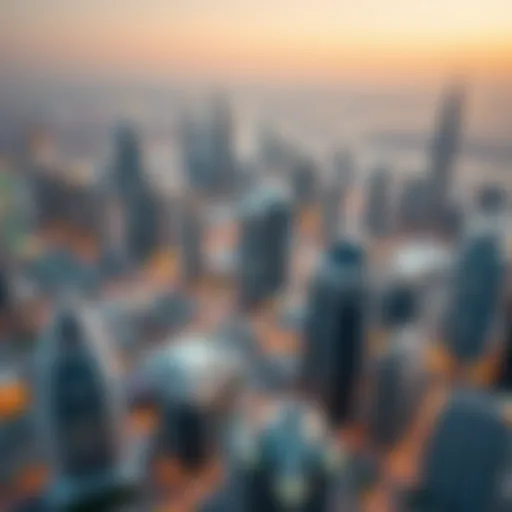Exploring the Souqs of Dubai: Cultural and Economic Insights
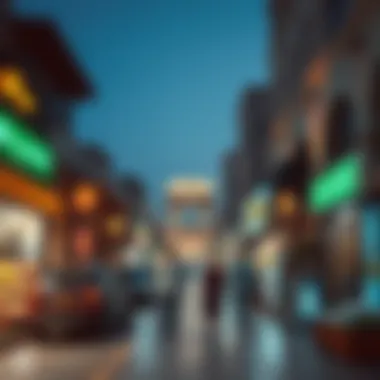

Intro
Dubai’s souqs are not just simple markets; they are a living tapestry of culture and commerce. Stepping into these vibrant spaces, one can almost hear the whispers of history echoing through the narrow alleyways, each corner exuding stories of ancient trade routes and generations of bustling activity. The souqs serve as more than just a shopping destination; they are a reflection of the cultural fabric that binds the community together, making them an invaluable part of Dubai’s identity.
As we delve deeper into the exploration of these traditional markets, we aim to illuminate their role in the modern economic landscape. The juxtaposition of old-world charm against a backdrop of rapid development creates a unique experience for both locals and tourists. It is essential to understand that these souqs are pivotal not just for their cultural significance, but also for their economic contributions.
In this article, we will first examine the current trends shaping these markets, shedding light on how consumer behavior has been shifting in light of burgeoning retail options. Furthermore, we will forecast potential developments in the coming years, revealing what the future holds for these traditional hubs.
Moreover, we will navigate through the various property types linked with the souqs—ranging from residential areas that thrive on their proximity to these bustling spaces to commercial properties catering to both residents and visitors alike. Whether you are an investor looking for promising opportunities or a home buyer searching for a vibrant lifestyle enhanced by cultural experiences, understanding the dynamics of Dubai's souqs is crucial.
Let’s embark on this journey to explore the intricate world of Dubai’s souqs and grasp their essence, both past and present.
Overview of Dubai's Souqs
Dubai's souqs offer a remarkable glimpse into the heart of the city's culture and commerce. These traditional markets serve as social and economic hubs, showcasing a vibrant contrast to the gleaming skyscrapers and modern malls surrounding them. Understanding the importance of these souqs not only helps one appreciate their beauty and charm but also unravels the intricate tapestry of Dubai's history and identity.
Historical Context
The souqs of Dubai have deep historical roots that date back to the early days of trade in the region. Before the discovery of oil, Dubai was primarily a trading port where merchants bought and sold goods, connecting East and West. Each souq, with its own unique offerings and character, has evolved over centuries to cater to the needs of the community and traders alike.
For instance, the Gold Souq emerged as a center for precious metals and jewelry, attracting buyers from around the globe. Meanwhile, the Spice Souq has preserved the same allure, where even now, the fragrant aroma of spices wafts through the winding alleys, reminding visitors of the city’s trading past.
The architecture of these marketplaces also reflects a rich history, with traditional wind towers and open-air spaces designed to promote airflow and shade, demonstrating practical design influenced by the desert climate. Engaging with these historical contexts can provide visitors not just with a shopping experience, but also a journey through time, embodying the essence of Dubai's evolution.
Cultural Importance
The cultural significance of Dubai's souqs transcends mere commerce; they are vibrant social spectrums interlaced with community connections and local traditions. Souqs like the Textile Souq serve not just as shopping venues but as community gathering spots, where stories are exchanged alongside goods. The local artisans in these souqs play a critical role in preserving Emirati culture—whether through traditional crafts or culinary practices.
In addition, souqs act as a bridge between cultures. As tourists explore these markets, they participate in a shared experience with locals, fostering a sense of community and belonging. The interactions in the souqs—between vendor and buyer, local and visitor—create lasting memories that contribute to a richer understanding of Emirati hospitality and culture.
"A souq is more than a market; it's where individuals become part of a living tapestry of culture and commerce."
In summary, the souqs of Dubai represent more than shopping destinations; they are a crucial part of the city's identity and societal fabric. The history and culture entwined in these traditional markets invite exploration, making them an essential topic in understanding modern Dubai.
Types of Souqs in Dubai
The souqs of Dubai are not merely shopping destinations; they are a vital pulse within the city’s cultural and economic heart. These traditional markets embody a blend of historical richness, vibrant interactions, and the everyday essence of community life. Exploring the various types of souqs provides insights into the colorful tapestry that makes up Dubai’s commercial landscape, while also contrasting with the sleek modernities of contemporary retail. By understanding the nuances of these markets, one appreciates the continued relevance of tradition in a rapidly evolving metropolis.
Gold Souq
History of the Gold Souq
The Gold Souq is steeped in history that resonates with anyone who steps into its gleaming lanes. Established in the 1940s, it serves as a barometer for the region's wealth and trade, reflecting Dubai's evolution from a coastal community reliant on pearl diving to a bustling trade hub. The Gold Souq offers an array of jewelry, much of which is crafted in accordance with traditional methods passed down through generations. The unique characteristic of this marketplace is the sheer volume and diversity of gold on display, from intricate necklaces to ornate earrings. This backdrop of history not only attracts tourists but also local buyers who seek to adorn themselves with pieces that tell a story.
Popular Transactions
Transactions in the Gold Souq often reflect the vibrancy of Emirati culture. The most popular dealings are not just about purchasing jewelry but also about the art of bargaining. Visitors learn quickly that haggling is part of the experience, where engaging with vendors can lead to more than just a good price; it opens doors to understanding local customs. Buyers delight in the flexibility of prices and the friendly negotiations that ensue, elevating a simple transaction to a rich interaction. This unique feature makes it a favored stop for shoppers, as the thrill of closing a deal forms an integral part of the experience.
Visitor Experience
Immersing oneself in the Gold Souq offers more than just shopping; it is a sensory experience. The dazzling displays of gold are complemented by the echoes of lively chatter and laughter that fill the air. As visitors navigate the narrow alleys, they find themselves engaged in vibrant exchanges with shopkeepers who often have captivating stories to share about their wares. The atmosphere is charged with a sense of community and hospitality, making it a beneficial experience for tourists wanting to connect with local culture. However, navigating the crowded spaces can be overwhelming for some, juxtaposing excitement with potential discomfort during busy hours.
Spice Souq
Variety of Available Spices
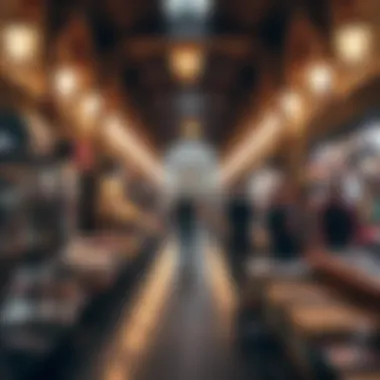

The Spice Souq is a breezy invitation to embrace Dubai's aromatic allure. It's a place brimming with vibrant colors and rich scents that beckon visitors. Spice merchants boast a vast array of products, from saffron to sumac, and everything in between. The essence of this souq lies in the diversity of spices. Not just a marketplace, it's a culinary passport to regions far and wide, inviting chefs and amateur cooks alike to explore new flavors. The unique feature is the possibility of purchasing blends created right on the spot, adding a personal touch to any meal. This souq stands out as a curiosity and a flavor-rich experience for anyone who enters.
Health Benefits and Uses
Beyond culinary delights, the Spice Souq also serves as a repository of knowledge about the health benefits associated with many spices. Turmeric, for instance, has gained recognition for its anti-inflammatory properties, while ginger is praised for its digestive aids. Vendors are happy to share insights about the medicinal uses, intertwining culinary traditions with cultural practices. This characteristic of the souq enhances its appeal, as it provides visitors with not only ingredients but also empowerment through knowledge. However, for those unfamiliar with spices, navigating the array can be a bit daunting without proper guidance.
Beyond Culinary: Cultural Significance
Spices in Emirati culture represent more than just flavor; they hold significant social and historical value. Many spices are intricately linked with traditional rituals and celebrations, echoing through generations of customs. Their inclusion in food symbolizes hospitality and the importance of communal gatherings. The cultural fabric is woven deeply with spices, reflecting the melting pot of influences that characterize Dubai’s heritage. This resonates well with visitors who often seek authentic experiences, reinforcing the notion that every meal tells a story.
Textile Souq
Types of Fabrics Offered
When wandering through the Textile Souq, visitors are greeted by an array of fabrics that reflect the rich history of trade routes. From luxurious silks to vibrant cottons, the selection is curated with precision, showcasing stunning patterns and textures. A notable characteristic is the abundance of traditional Emirati attire, allowing individuals to connect with the local way of life. It's an exceptional destination for patrons interested in unique pieces for their wardrobes. However, the sheer volume of choices can be overwhelming, leaving some unsure of where to start.
Artisan Crafts and Goods
Artisan crafts in the Textile Souq spill over into visual artistry. Not only can one find fabrics, but there are also exquisite handcrafted goods like rugs and intricate embroidery. Each piece tells a different story about the craftsmen and the skills they possess. This aspect of the souq showcases the importance of preserving traditional methods against the backdrop of contemporary fashion trends. It presents a unique opportunity to engage with local artisans, though discerning true craftsmanship can sometimes be a challenge amidst mass-produced items.
Fashion Trends in Dubai
The Textile Souq reflects the fashion evolution in Dubai, where tradition and modernity coexist. Visitors can see how contemporary styles are seamlessly blended with traditional fabrics, appealing to both locals and tourists alike. This mingling of old and new underscores the dynamic nature of Dubai’s fashion landscape. However, many shoppers might find the rapid changes in trends confusing, especially when trying to identify what is considered classic versus trendy.
Perfume Souq
Traditional Perfume Making
In the Perfume Souq, the atmosphere is a sensory delight. Here, the age-old art of traditional perfume making becomes apparent. Many vendors craft scents using age-old recipes handed down through families, reflecting a deep reverence for their heritage. This uniqueness makes the souq a special destination not just for shopping but for experiencing the rich tapestry of scents that symbolize the Emirati spirit. However, the subtleties of scent creation can be perplexing for first-time visitors, as they are often confronted with unfamiliar notes and bases.
Customization and Personalization
Customization in the Perfume Souq is a standout experience where buyers can create scents uniquely their own. This personal touch lends itself to creating a lasting memory, whether as a gift or a personal keepsake. Shoppers have the opportunity to blend different essences and scents, reflecting their personal tastes. While this level of customization is appealing, some may find it challenging without prior knowledge of which combinations work well together.
Scent as Identity in Emirati Culture
In Emirati culture, scents play a fundamental role in one’s identity. Traditional fragrances are often linked with personal milestones or social representations. For many, the scent evokes nostalgia and connections to familial bonds. Visiting the Perfume Souq is not just about purchasing a fragrance; it is about understanding its emotional resonance. However, the pressure on visitors to choose a scent can sometimes detract from the experience, especially for those who may feel overwhelmed by the options available.
Antique Souq
Historical Artifacts
The Antique Souq is a treasure trove of historical artifacts that whisper tales of the past. From ancient coins to vintage jewelry, the collection speaks volumes about the region's rich history and trade relationships. The unique characteristic lies in the authenticity of the items, some dating back to centuries. This feature makes the souq a crucial destination for historians and collectors alike. However, discerning genuine antiquities from replicas can often prove to be a convoluted task for the untrained eye.
Collectibles and Investments
Investing in collectibles within the Antique Souq presents both opportunities and risks. Many items have the potential to appreciate in value, making the market appealing to savvy investors. Here, patrons find unique pieces that carry stories and heritage, bolstering their appeal as investments. However, potential buyers must exercise due diligence; without the right expertise, it’s easy to misjudge an item's actual worth.
Authenticity and Valuation
Authenticity is paramount in the Antique Souq, as the value of many artifacts depends heavily on proven provenance. A well-documented history adds to the allure of collectibles and can significantly affect pricing. Visitors must be prepared to ask questions and seek verification of the items they are interested in. This emphasis on authenticity makes the souq both a compelling and complex environment for potential buyers.
Economic Significance of Souqs
The souqs of Dubai are not just a glimpse into the past; they are crucial cogs in the city's economic machinery. These traditional markets serve a vital role that extends beyond mere commerce. They reflect the historical trading practices and cultural intermingling that have defined Dubai’s growth. Understanding the economic significance of these souqs offers important insights for various stakeholders including investors, property managers, and real estate agents.
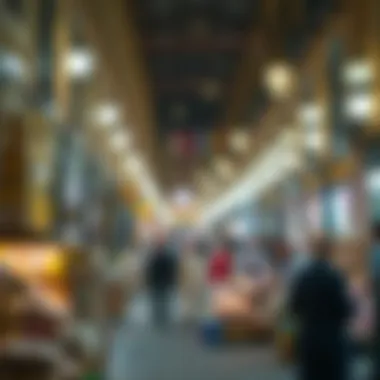

Role in Local Economy
The souqs, with their bustling atmosphere and array of offerings, contribute significantly to Dubai's local economy. They provide a platform for local artisans and vendors, allowing small businesses to thrive in an otherwise highly competitive market.
- Employment Opportunities: These souqs are job creators. Many locals find work in both permanent and temporary positions, ranging from shopkeepers to vendors selling food and handcrafted goods.
- Support for Traditional Crafts: By selling handmade textiles, spices, and perfumes, the souqs help sustain traditional Emirati crafts that might otherwise fade into obscurity. Local artisans benefit from direct sales, thus preserving their skills and contributing economically.
- Market for Local Goods: Many souqs actively promote local goods, which reduces reliance on imported products. This not only benefits the environment by lowering transportation emissions, but also ensures that more money circulates within the local economy.
The integration of these traditional markets into the urban landscape fosters a sense of community bond among residents, encouraging them to support local businesses and partake in the unique offerings that souqs provide.
Impact on Tourism
Souqs also act as a major draw for tourists seeking authentic experiences. Unlike conventional malls, these markets provide an immersion into the local culture, rich history, and the charm of Arab hospitality. Here’s how they impact tourism:
- Cultural Experience: Tourists flock to the souqs for a taste of local flavor—both literally and metaphorically. The vibrant exchanges and diverse products encourage travelers to spend time and money in these areas, enriching their overall experience.
- Culinary Attraction: The Spice Souq, for example, attracts visitors not only for its offerings but also for the iconic sights and scents synonymous with Dubai. Tourists are often eager to purchase spices, oils, and fragrances unique to the region, thus sustaining a continuous influx of cash flow.
- Souvenirs Resale: Tourists often indulge in purchasing traditional artifacts and crafts, which serve as memorable takeaways from their visit. These souvenirs contribute to the economy by providing significant revenue for local artisans.
The souqs are the beating heart of Dubai’s economy, showcasing not just goods, but also the city’s vibrant culture and heritage.
From stimulating local employment to crafting unique tourist experiences, the economic role of souqs cannot be overstated. By understanding the dynamics at play within these markets, stakeholders can look for investment opportunities that align with both historical traditions and modern market needs. This understanding will also guide buyers and renters when considering property options in proximity to these cultural hubs.
Real Estate Dynamics Surrounding Souqs
The bustling souqs of Dubai are not merely hubs of commerce and culture; they also significantly influence the surrounding real estate market. Understanding the dynamics shapes both investment strategies and community development. The interplay between these markets reflects a delicate balance between tradition and modernity, offering insights into the unique fabric of Dubai’s economic landscape.
Commercial Properties
Valuation Trends
In the realm of real estate, valuation trends are vital for both investors and stakeholders. The proximity to vibrant souqs often boosts the value of commercial properties. Quantifying this trend reveals the strong demand for retail spaces, significantly influenced by foot traffic from visitors and locals alike. The key characteristic of these valuation trends is their responsiveness to market signals such as tourist influx and seasonal shopping habits.
One notable feature of valuation trends is their potential for rapid escalation in times of high demand, creating attractive opportunities for property owners.
However, this can lead to challenges, particularly for small businesses that find it harder to keep up with rising rents. This aspect is crucial for anyone considering investment in commercial areas near souqs, as understanding these trends can be the difference between a sound investment and a financial misstep.
Investment Opportunities
Investment opportunities near souqs present a compelling case, emphasizing both immediate revenue and long-term growth potential. One noteworthy aspect is the flexibility these properties offer; owners can adapt spaces for various retail formats or blend them with cozy cafés, enhancing visitor experience. Such adaptability increases appeal to a diverse clientele, making these investments lucrative.
The probability of profit in this area is a beneficial factor for investors aiming for a multi-faceted involvement in the local economy. However, as the market heats up, buyers must also consider the possibility of market saturation. This can affect future profitability, a factor that must not be overlooked during investment assessments.
Residential Areas Nearby
Market Analysis
Market analysis of residential properties around souqs offers unique insights into lifestyle preferences and demographics. As urban populations continue to grow, the demand for nearby housing has surged, resulting in increased interest from investors. A key feature of this analysis is the high rental yield that properties in these areas can yield, making them attractive for landlords and real estate enthusiasts.
Furthermore, living close to souqs provides residents with convenience. It’s a blend of cultural immersion and access to daily necessities and entertainment. However, whether one lives here also has its drawbacks, primarily the noise and hustle associated with busy markets.
Living Near Traditional Markets
Living near traditional markets comes with its own set of benefits and challenges. The daily experience of being steps away from the vibrant surroundings of souqs enriches life with culture, food, and community. One outstanding characteristic of residing in these areas is the sense of belonging to a lively tapestry of life, as one continuously interacts with both locals and visiting tourists.
Nonetheless, potential downsides include the potential for overcrowding and heightened competition for parking and public spaces. Despite that, many residents find that these challenges are a small price to pay for the culture and convenience.
As this section illustrates, the real estate dynamics surrounding Dubai's souqs are multifaceted and vital to understanding the broader economic implications for both commercial and residential investments.
Challenges Facing Souqs
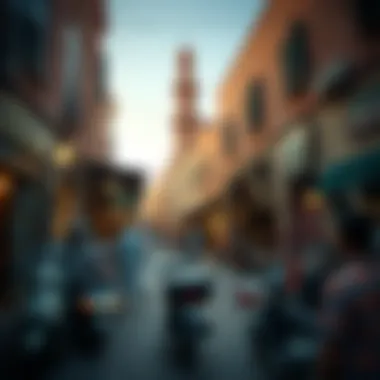

The souqs of Dubai are more than just vibrant marketplaces; they represent a tapestry of cultural heritage, economic vitality, and community. However, as with any traditional institution, these markets face challenges that threaten their existence and relevance in an increasingly modernized world. Addressing these issues is crucial as the souqs not only hold history but also foster the local economy and tourism.
Competition from Modern Retail
Dubai's retail landscape is rapidly evolving, heavily influenced by international brands and modern shopping complexes such as The Dubai Mall and Mall of the Emirates. This shift presents serious competition to the traditional souqs, which often struggle to keep pace with the convenience and amenities offered by contemporary shopping destinations. \n\nFirst, the sheer scale of modern retail locations is daunting. Visitors find it easier to navigate massive air-conditioned spaces with a plethora of global brands at their fingertips. This accessibility draws shoppers away from the labyrinthine alleys of Dubai's souqs, where navigating small shops and bargaining for prices remains a vibrant yet time-consuming experience.
Furthermore, marketing strategies play a critical role in attracting customers. Many modern malls invest heavily in promotions, events, and high-end advertising that captivate the local population and tourists alike. Souqs, on the other hand, often rely on word-of-mouth and nostalgic charm rather than the extensive marketing campaigns of their modern counterparts. Therefore, without adopting innovative promotional methods, they risk fading into obscurity.
To cope with this competition, some souqs have begun embracing technology. Initiatives such as online marketplaces and social media presence allow individual merchants to showcase their products beyond the physical space, potentially drawing in customers who may not otherwise visit. However, a blend of tradition and modernity remains essential; while technology is a lifeline, the unique experience of the souqs must remain intact for them to thrive.
Preserving Cultural Heritage
In the face of modernization, another significant issue for the souqs is the preservation of their cultural heritage. These markets are repositories of Emirati tradition, showcasing local crafts, culinary specialties, and communal interactions that have flourished for generations. However, with rapid urban development and a focus on globalization, elements of this cultural tapestry are at risk.
There’s a fine line between updating a marketplace to attract visitors and erasing the authentic character that defines it. For instance, renovations may inadvertently replace unique features with generic designs that dilute the charm of places like the Spice Souq or the Gold Souq. Maintaining an authentic atmosphere while meeting modern expectations can often pit developers against the traditionalists—the concept of authenticity must prevail but is put to the test.
Efforts to conscious efforts, such as cultural festivals and artisan showcases, help emphasize the uniqueness of these traditional markets. These events not only draw in crowds but also serve as platforms for local artisans to display their crafts, thus preserving centuries-old skills and knowledge.
Investors and entrepreneurs have a unique opportunity to get involved here. By supporting initiatives that focus on cultural programs, they can play a pivotal role in safeguarding this heritage while also benefiting economically.
"In a world that changes by the minute, some treasures like the souqs must stand their ground, weaving the past into the present."
In sum, the challenges facing the souqs of Dubai reflect larger global trends in retail and cultural preservation. Addressing competition from modern retail while simultaneously committing to maintaining cultural heritage will create a sustainable environment where the souqs can continue to thrive as unique facets of the city’s identity.
Future Prospects of Souqs in Dubai
The souqs of Dubai, with their rich tapestry of culture and vibrant trading environments, have always played a crucial role in the city’s identity. As Dubai continues to evolve and embrace modernity, the future of these traditional markets raises interesting questions about their viability and relevance in an ever-changing economic landscape. This section explores key aspects of this future, considering how the souqs will integrate into modern business paradigms and adopt sustainable practices that will both honor tradition and innovate.
Integration with Modern Business Models
The landscape of retail has undergone profound shifts, thanks in large part to technology and changing consumer behaviors. In this context, the traditional souqs need to adapt to survive. One way they can strive to stay relevant is through the integration of modern business models. This isn't about erasing the essence of what a souq is; it's about enhancing customer experiences while still keeping the charm that draws people in.
Digital Transformation
By incorporating e-commerce capabilities, local vendors can reach a broader audience. Many consumers today prefer the convenience of online shopping, often seeking unique and exotic items that are hard to find in standard retail outlets. Establishing a digital presence could allow souqs to showcase their unique products—like spices, textiles, and handmade crafts—to a global customer base. For instance, a vendor at the Spice Souq could set up an online store where customers place orders for rare spices that can be shipped worldwide.
Experiential Retail
Moreover, integrating experiential retail concepts—where shoppers engage in interactive experiences—can draw in tech-savvy tourists and locals alike. Imagine workshops held at the Textile Souq where participants learn to weave, or scent blending classes at the Perfume Souq, allowing customers to craft their personalized fragrances. These experiences can elevate the shopping trip from a mere transaction to an enriching adventure, encouraging repeat visits as well as word-of-mouth promotion.
Having a synergistic relationship with modern businesses can help bridge the gap between old and new. Collaborations with global brands could also bring innovative approaches to marketing, merchandising, and logistics. The participation of local artisans in global networks might further amplify their craft while preserving the cultural essence they represent.
Sustainable Practices
As the world leans increasingly towards sustainability, Dubai's souqs are not immune to this trend. Adopting sustainable practices is not just a duty but a significant opportunity to appeal to environmentally-conscious consumers.
Sourcing
Vendors can place a strong emphasis on sourcing locally, reducing the carbon footprint associated with transportation. Utilizing organic or sustainably produced materials can enhance the credibility and allure of products, making them more attractive to a conscientious audience.
Additionally, ethical business practices could become a hallmark of these markets, where vendors openly share information about the origins of their products. For example, a spice vendor might work directly with farmers to ensure fair trade practices, thus adding a narrative to their products that encourages sales through shared values with consumers.
Waste Reduction
Introducing waste reduction strategies, such as encouraging customers to bring reusable bags and containers, can promote sustainable shopping habits. Crafting initiatives that convert waste materials into products or art can not only minimize trash but ignite creativity among local artisans.
"The future of souqs in Dubai is not just about retaining their historical significance but also about evolving to meet modern expectations while embracing sustainability."
Epilogue
In concluding our exploration of Dubai's souqs, it’s critical to reflect on their multifaceted roles and enduring significance. These traditional markets are not merely sites for commercial exchange; they embody a living tapestry of Dubai's rich cultural heritage, infusing the modern city with charm and character that resonates deeply with both locals and visitors alike.
Summarizing Key Insights
As we peel back the layers of Dubai's souqs, a few key elements emerge clear as day:
- Cultural Embodiment: The souqs act as a bridge connecting the past with the present. They are vibrant hubs where aged traditions meet contemporary commerce, showcasing local crafts and goods that tell stories of the region’s history.
- Economic Pillars: Beyond their cultural allure, these markets play an essential role in the local economy. The influx of tourists is a boon not just for traders but for the broader economic landscape, enhancing opportunities for investment and growth. A thriving souq attracts foot traffic which benefits surrounding businesses and stimulates job creation.
- Real Estate Dynamics: The areas surrounding these souqs become highly coveted real estate zones. Residential properties near these marketplaces often see increased demand, influencing their valuation trends. Investors should recognize that proximity to vibrant commercial precincts can significantly enhance property appeal.
- Sustainability and Modern Adaptation: Looking ahead, the future of these markets will hinge on how they integrate modern business practices while respecting their traditional roots. Sustainability initiatives will be crucial in ensuring these sites thrive, preserving their essence for future generations.
- Community Engagement: The souqs foster a sense of community. They serve as gathering points, encouraging social interaction among diverse groups, enriching the cultural fabric of Dubai. These interactions promote a sense of belonging that resonates strongly in an ever-evolving urban environment.
In sum, the souqs of Dubai stand as a testimony to the city’s vibrant blend of tradition and modernity. For investors and home buyers alike, understanding their importance offers invaluable insights into both cultural richness and economic potential.
As you traverse these lively markets, remember that you are part of a larger narrative, one that connects the heartbeat of Dubai’s past with its ambitious foresight into the future.

